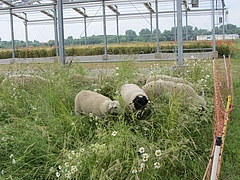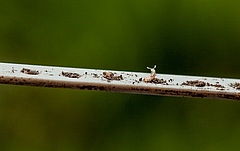11.04.2019 | TOP NEWS, Experimental Interaction Ecology, iDiv Members
Extensive grassland use is not sufficient to mitigate climate change

In the experiment, extensively managed grasslands were either moderately mown or grazed by sheep (photo: Julia Siebert).

Diplopods are small soil animals contributing to decomposition processes (photo: Julia Siebert).

The GCEF research platform. Steel constructions with mobile roof and side panels allow the researchers to experimentally manipulate precipitation and temperature. (photo: Julia Siebert).
Note for the media: Use of the pictures provided by iDiv is permitted for reports related to this media release only, and under the condition that credit is given to the picture originator.
Soil activity decreases nevertheless
Leipzig/Bad Lauchstädt. Climate change and intensified land use are among the most pervasive human impacts on terrestrial ecosystems. On agriculturally used areas it is therefore of particular importance to assess the consequences and develop appropriate countermeasures to maintain the functionality and productivity of such ecosystems in the future. Especially with regard to soil processes considerable knowledge gaps still remain. A team of researchers from the German Centre for Integrative Biodiversity Research (iDiv), Leipzig University, and the Helmholtz Centre for Environmental Research (UFZ) now published a comprehensive two-year field study, in which they provide insight into the effects of future climate conditions and differently managed grassland systems on soil microbial and invertebrate activity. “Despite the known relevance of belowground organisms for nutrient cycling and other important processes in grasslands, there are still many open questions that need to be addressed,” says Professor Nico Eisenhauer, senior author of the study that was published in Advances in Ecological Research this week. The study was conducted from March 2015 to April 2017 within the framework of the Global Change Experimental Facility (GCEF) at the UFZ in Bad Lauchstädt (Saxony-Anhalt). The GCEF offers unique opportunities for the simulation of future climatic conditions (including dynamic alterations in temperature and precipitation patterns over the course of the year) in different agricultural land-use scenarios. With almost 40 consecutive sampling events, the present study has the potential to advance the scientific field by providing detailed insight into belowground activity patterns. “We could show that climate change has significantly reduced soil biological activity over the entire study period, which certainly can have serious consequences for agriculture,” comments Julia Siebert, lead author of the study. Moreover, the researchers revealed that the simulated climate conditions led to a clear shift in activity patterns towards earlier activity peaks in the year (on average 29 days earlier) – an effect that was previously mainly known from aboveground organisms. Thus, the current results indicate complex shifts in aboveground and belowground interactions to be expected in the future. Furthermore, the team was also able to confirm a reduction in soil activity in response to intensive grassland management. “What is particularly interesting about our results, however, is that the extensive use of grasslands was not sufficient to mitigate the effects of climate change on soil activity,” says Julia Siebert. On the contrary, the study even shows that extensively used systems were particularly affected by climate change. The maintenance of these valuable, species-rich ecosystems thus represents a major challenge. “To ensure the stable provision of soil functions in the future, and hence reliable crop yields, it is crucial to develop additional measures and strategies to secure such essential ecosystem functions under the influence of climate change,” says Nico Eisenhauer.Julia Siebert
Original publication:
(iDiv researchers in bold)Julia Siebert, Madhav P.Thakur, Thomas Reitz, Martin Schädler, Elke Schulz, Rui Yin, Alexandra Weigelt, Nico Eisenhauer: Extensive grassland-use sustains high levels of soil biological activity, but does not alleviate detrimental climate change effects. Advances in Ecological Research (2019). https://doi.org/10.1016/bs.aecr.2019.02.002
Contact:
Julia SiebertResearch group Experimental Interaction Ecology
German Centre for Integrative Biodiversity Research (iDiv) Halle-Jena-Leipzig
Leipzig University
Tel: +49 341 9736882
Mail: julia-siebert@idiv.de
Web: https://www.idiv.de/en/groups_and_people/employees/details/eshow/siebert_julia.html
